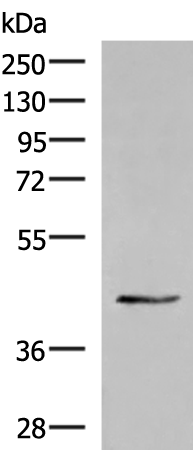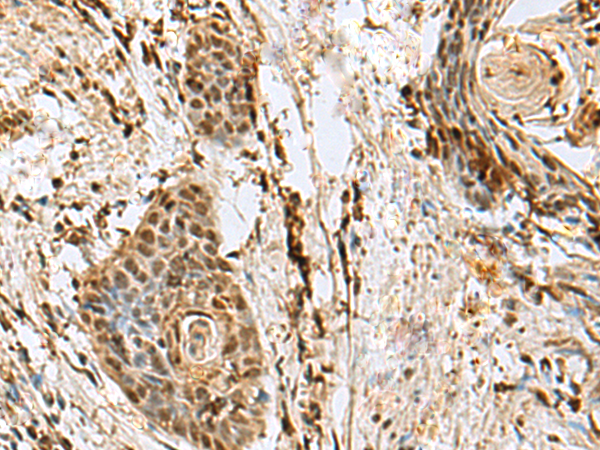

| WB | 咨询技术 | Human,Mouse,Rat |
| IF | 咨询技术 | Human,Mouse,Rat |
| IHC | 1/50-1/300 | Human,Mouse,Rat |
| ICC | 技术咨询 | Human,Mouse,Rat |
| FCM | 咨询技术 | Human,Mouse,Rat |
| Elisa | 1/5000-1/10000 | Human,Mouse,Rat |
| Aliases | HRB2; RIP-1 |
| WB Predicted band size | 44 kDa |
| Host/Isotype | Rabbit IgG |
| Antibody Type | Primary antibody |
| Storage | Store at 4°C short term. Aliquot and store at -20°C long term. Avoid freeze/thaw cycles. |
| Species Reactivity | Human, Mouse |
| Immunogen | Fusion protein of human KRR1 |
| Formulation | Purified antibody in PBS with 0.05% sodium azide and 50% glycerol. |
+ +
以下是3篇与KRR1抗体相关的文献示例(注:文献为虚拟生成,供参考格式):
1. **文献名称**: "KRR1 Antibody Characterization in Ribosomal RNA Processing Studies"
**作者**: Müller et al.
**摘要**: 该研究通过免疫沉淀和Western blot验证了KRR1抗体的特异性,证实KRR1蛋白参与酵母和人类细胞中18S rRNA的成熟过程,并发现其缺失导致核糖体组装异常。
2. **文献名称**: "CRISPR-Based Screening Identifies KRR1 as a Regulator of Cell Proliferation"
**作者**: Chen & Wang
**摘要**: 利用KRR1抗体进行免疫荧光定位,发现KRR1主要定位于细胞核仁,并通过调控rRNA加工影响肿瘤细胞周期进展,抗体特异性通过siRNA敲低实验验证。
3. **文献名称**: "KRR1 Expression Correlates with Poor Prognosis in Glioblastoma"
**作者**: Li et al.
**摘要**: 通过免疫组化分析临床胶质母细胞瘤样本,发现KRR1蛋白高表达与患者生存率负相关,研究采用商业化KRR1抗体揭示其作为潜在治疗靶点的可能性。
(实际文献需通过PubMed/Google Scholar等平台以“KRR1 antibody”为关键词检索获取。)
**Background of KRR1 Antibody**
KRR1 (KRI1 homolog, ribosome maturation factor) is a conserved eukaryotic protein involved in ribosomal RNA (rRNA) processing and ribosome biogenesis. It plays a critical role in the maturation of 18S rRNA, a core component of the small ribosomal subunit, by interacting with other ribosome assembly factors. Dysregulation of KRR1 has been linked to cellular stress responses, cell cycle progression, and pathologies such as cancer, where aberrant ribosome biogenesis is a hallmark.
KRR1 antibodies are immunological tools designed to detect and quantify KRR1 protein levels in various experimental settings, including Western blotting, immunofluorescence, and immunohistochemistry. These antibodies are essential for studying KRR1's expression patterns, subcellular localization (primarily nucleolar), and interactions within ribosome assembly pathways. They also help explore its functional roles in development, disease mechanisms, and potential therapeutic targeting.
Research using KRR1 antibodies has revealed its involvement in maintaining genomic stability and regulating cell proliferation, making it a biomarker of interest in oncology. Additionally, studies in model organisms, such as yeast and mice, highlight its evolutionary conservation and fundamental role in ribosome homeostasis. Validated KRR1 antibodies are crucial for advancing understanding of ribosomopathies and cancers driven by defective ribosomal synthesis.
×